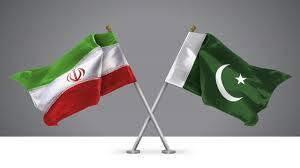
Senior officials of Iran and Pakistan signed 12 cooperation documents in the presence of the leaders of the two countries, covering various sectors including science and technology, transportation and transit, economy and trade, tourism, and agriculture.
During the official visit of President Masoud Pezeshkian to Pakistan on Sunday, senior officials of both countries signed the agreements after holding a joint meeting aimed at facilitating and paving the way for the development of bilateral cooperation.
The areas covered by these agreements include tourism, agriculture, judicial and legal cooperation, industry, science and technology, transport and transit, cultural heritage, and trade and economic collaboration, ISNA reported.
The signed documents provide a framework for facilitating knowledge exchange, expanding trade capacities, strengthening people-to-people interactions, and fostering regional synergy between the two nations.
President Masoud Pezeshkian, following the signing of 12 cooperation memoranda with Pakistani officials, said, “I am pleased to be in my second home, dear Pakistan. I sincerely thank the honorable government and my dear brother, Prime Minister Shehbaz Sharif, for their warm hospitality.”
He continued that the positions of the government, parliament, political parties, and the esteemed scholars of Pakistan in defending and supporting the Islamic Republic of Iran during the 12-day terrorist aggression by the Zionist regime and the United States were very encouraging.
The president expressed heartfelt gratitude for Pakistan’s support against the Israeli attack on Iran, emphasizing that the friendship between Iran and Pakistan is deeply rooted in history, with strong religious, cultural, and spiritual bonds between the two nations.
He stressed that promoting neighborly relations is a central principle of Iran’s foreign policy, adding that Iran views Pakistan not just as a neighbor, but as a brotherly state.
Highlighting the joint commitment to deepening ties in all areas, Pezeshkian said he firmly believes bilateral trade can easily be increased from the current $3 billion to the targeted $10 billion in a short period.
Referring to the 12 cooperation memorandums signed between the two countries, he noted that important agreements were reached in political, economic, trade, and cultural fields, which will facilitate and enhance relations in trade, culture, tourism, transportation, and academic exchange.
Senior officials of Iran and Pakistan signed 12 cooperation documents in the presence of the leaders of the two countries, covering various sectors including science and technology, transportation and transit, economy and trade, tourism, and agriculture.
During the official visit of President Masoud Pezeshkian to Pakistan on Sunday, senior officials of both countries signed the agreements after holding a joint meeting aimed at facilitating and paving the way for the development of bilateral cooperation.
The areas covered by these agreements include tourism, agriculture, judicial and legal cooperation, industry, science and technology, transport and transit, cultural heritage, and trade and economic collaboration.
The signed documents provide a framework for facilitating knowledge exchange, expanding trade capacities, strengthening people-to-people interactions, and fostering regional synergy between the two nations.
He emphasized Iran’s determination to continue contacts and talks to implement these agreements, adding that expanding transit routes — rail, road, and sea — developing and equipping border markets, facilitating trade, and establishing joint economic zones are key needs in bilateral relations, and constructive discussions were held in these areas.
Pezeshkian also noted that, given the threats posed by terrorist groups in border areas, enhancing bilateral cooperation to secure the borders and ensure peace for residents of border towns has been a focus of talks.
While the Zionist regime waged a war of aggression against Iran on June 13 and struck Iran’s military, nuclear and residential areas for 12 days, the US stepped in and conducted military attacks on three nuclear sites in Iran’s Natanz, Fordow, and Isfahan on June 22.
The Iranian military forces conducted powerful counterattacks immediately after the aggression. The Islamic Revolution Guards Corps Aerospace Force carried out 22 waves of retaliatory missile strikes against the Zionist regime as part of Operation True Promise III, which inflicted heavy losses on cities across the occupied territories.
Also, in response to the US attacks, Iranian armed forces launched a wave of missiles at al-Udeid air base in Qatar, the largest American military base in West Asia.
A ceasefire that came into force on June 24 brought the fighting to a halt.